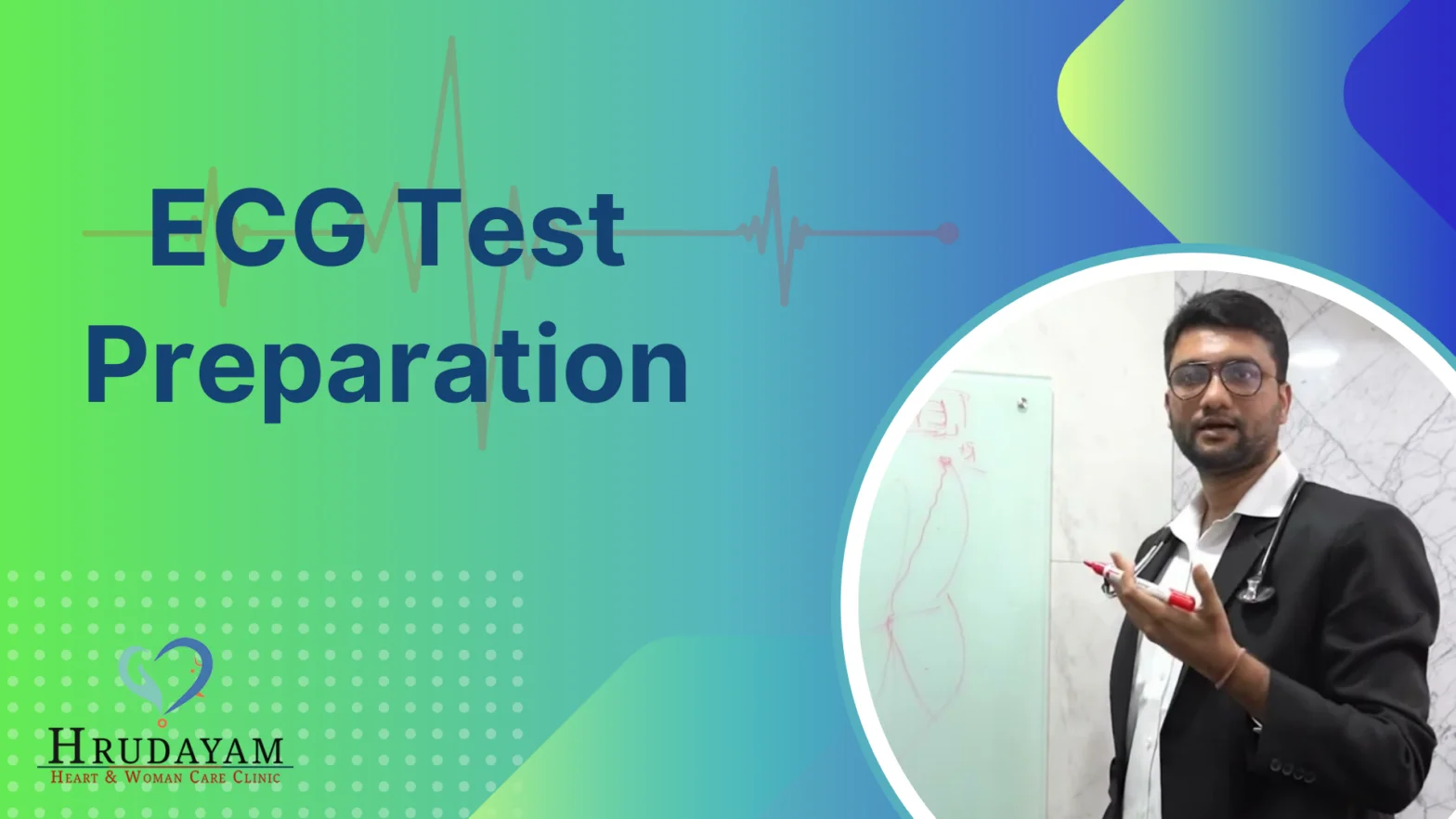Hrudayam Heart & Woman Care Clinic
How to Prepare for an ECG Test
How to Prepare for an ECG Test
An ECG (electrocardiogram) test is a simple, non-invasive procedure used to measure the electrical activity of your heart. It helps doctors diagnose heart conditions such as arrhythmias, heart attacks, or heart disease. If your doctor has recommended an ECG, you may be wondering how to prepare for the test. Proper preparation ensures accurate results or a smooth experience. Here’s a guide to help you understand what to do before your ECG test.

What is an ECG Test?
An ECG test records the electrical signals that control the heartbeat. During the test, small electrodes are placed on your chest, arms, and legs. These electrodes detect and transmit the heart’s electrical impulses to a machine, creating a graphic representation (ECG) of your heart’s rhythm and activity. The procedure is quick, typically lasting about 5 to 10 minutes, and is painless.
Why is Preparing for an ECG Important?
While the ECG test itself is simple and easy, there are a few steps you can take to ensure the results are accurate. The test records the electrical signals of your heart, so it’s important to minimize factors that could interfere with the readings, such as skin oils or lotions. Preparing properly also helps you feel comfortable and know what to expect during the procedure.
Steps to Prepare for an ECG Test
- Tip: Avoid wearing tight or restrictive clothing that may make it difficult to access the areas where the electrodes will be placed.
- Tip: If possible, avoid eating heavy meals within two hours before your ECG test. A light meal or snack should be fine.
- Tip: Stay away from coffee, energy drinks, tea, and cigarettes before your test to prevent any interference with the readings.
-
- Tip: Shower before your ECG, but avoid applying any moisturizing products to your skin on the day of the test.
- Tip: Follow your doctor’s instructions regarding whether to take your regular medications before the test. For some medications, you may need to pause them temporarily, while others should be taken as usual.
- Tip: Rest for at least 30 minutes before your ECG test to ensure your heart rate returns to normal.
- Tip: If you have sensitive skin, let the technician know before the test. They may use a gentler adhesive or take extra care during the procedure.
- You will be asked to lie down on an exam table, and electrodes will be attached to your chest, arms, and legs.
- The technician will connect the electrodes to the ECG machine, which will record your heart’s electrical activity.
- The procedure usually takes about 5 to 10 minutes, and you may be asked to remain still and quiet during the test to ensure accurate readings.
- Tip: The test is quick, and you will be able to resume your normal activities immediately after it’s finished.
What Happens After the ECG Test?
Once the test is complete, you can expect to:
- Remove the electrodes: The technician will carefully remove the electrodes, and you may need to clean off any adhesive residue.
- Receive the results: Your doctor will analyze the ECG readings and discuss the results with you at a follow-up appointment. In some cases, your doctor may immediately review the results with you.
- If the test results suggest abnormalities, your doctor may recommend additional tests or treatment options based on your condition.
Conclusion
Proper preparation for your ECG test is important to ensure that the results are as accurate as possible. By following the simple steps above, such as wearing comfortable clothing, avoiding heavy meals and stimulants, and informing your doctor about your medications, you can help ensure a smooth and successful ECG experience. Remember, the ECG test itself is quick, painless, and non-invasive, making it an essential tool in diagnosing heart conditions.
If you have any specific questions or concerns before the test, don’t hesitate to contact your healthcare provider. They will be happy to guide you through the process and ensure that you feel confident and comfortable.
FAQs of Dyslipidemia
What is an ECG test?
An ECG (electrocardiogram) test is a procedure that records the electrical activity of your heart. It helps doctors assess heart function and diagnose conditions like arrhythmias, heart attacks, and other heart diseases. The test is painless, quick, and non-invasive.
How should I prepare for an ECG test?
To prepare for an ECG test, wear loose, comfortable clothing and avoid applying lotions or oils to your skin. Refrain from consuming caffeine or nicotine for at least 4 hours before the test, and inform your doctor about any medications you’re taking.
Do I need to fast before an ECG test?
No, fasting is not required for an ECG test. However, it’s a good idea to avoid large meals immediately before the test, as they can affect your heart rate and digestion, potentially influencing results.
Can I exercise before an ECG test?
It’s recommended to avoid strenuous physical activity for at least 30 minutes before the test. Physical exertion can temporarily alter your heart rate and might affect the accuracy of the results.
Should I take my medications before the ECG test?
Generally, you should continue taking your regular medications unless instructed otherwise by your doctor. Some medications, such as those for heart conditions, may need adjustments before the test. Always follow your doctor’s guidance regarding your medications.
